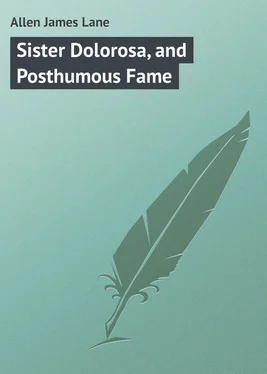James Allen - Sister Dolorosa, and Posthumous Fame
Здесь есть возможность читать онлайн «James Allen - Sister Dolorosa, and Posthumous Fame» — ознакомительный отрывок электронной книги совершенно бесплатно, а после прочтения отрывка купить полную версию. В некоторых случаях можно слушать аудио, скачать через торрент в формате fb2 и присутствует краткое содержание. Жанр: foreign_prose, на английском языке. Описание произведения, (предисловие) а так же отзывы посетителей доступны на портале библиотеки ЛибКат.
- Название:Sister Dolorosa, and Posthumous Fame
- Автор:
- Жанр:
- Год:неизвестен
- ISBN:нет данных
- Рейтинг книги:4 / 5. Голосов: 1
-
Избранное:Добавить в избранное
- Отзывы:
-
Ваша оценка:
- 80
- 1
- 2
- 3
- 4
- 5
Sister Dolorosa, and Posthumous Fame: краткое содержание, описание и аннотация
Предлагаем к чтению аннотацию, описание, краткое содержание или предисловие (зависит от того, что написал сам автор книги «Sister Dolorosa, and Posthumous Fame»). Если вы не нашли необходимую информацию о книге — напишите в комментариях, мы постараемся отыскать её.
Sister Dolorosa, and Posthumous Fame — читать онлайн ознакомительный отрывок
Ниже представлен текст книги, разбитый по страницам. Система сохранения места последней прочитанной страницы, позволяет с удобством читать онлайн бесплатно книгу «Sister Dolorosa, and Posthumous Fame», без необходимости каждый раз заново искать на чём Вы остановились. Поставьте закладку, и сможете в любой момент перейти на страницу, на которой закончили чтение.
Интервал:
Закладка:
"How cold thou art! Shall I take thee in and warm thee on my bosom? Ah, no! For I know who thou art! Not a bird, but a little brown mendicant friar, begging barefoot in the snow. And thou livest in a cell under the convent eaves opposite my window. What ugly feet thou hast, little Father! And the thorns are on thy toes instead of about thy brow. That is a bad sign for a saint. I saw thee in a brawl the other day with a mendicant brother of thine order, and thou drovest him from roof to roof and from icy twig to twig, screaming and wrangling in a way to bring reproach upon the Church. Thou shouldst learn to defend a thesis more gently. Who is it that visits thy cell so often? A penitent to confess? And dost thou shrive her freely? I'd never confess to thee, thou cross little Father! Thou'dst have no mercy on me if I sinned, as sin I must since human I am. The good God is very good to thee that He keeps thee from sinning while He leaves me to do wrong. Ah, if it were but natural for me to be perfect! But that, little Father, is my idea of heaven. In heaven it will be natural for me to be perfect. I'll feed thee no longer than the winter lasts, for then thou'lt be a monk no longer, but a bird again. And canst thou tell me why? Because, when the winter is gone, thou'lt find a mate, and wert thou a monk thou'dst have none. For thou knowest perfectly well, little Father, that monks do not wed."
"No fitting emblem of my soul art thou, fragile Psyche, mute and perishable lover of the gorgeous earth. For my soul has no summer, and there is no earthly object of beauty that it may fly to and rest upon as thou upon the beckoning buds. It is winter where I live. All things are cold and white, and my soul flies only above fresh fields of flowerless snow. But no blast can chill its wings, no mire bedraggle, or rude touch fray. I often wonder whether thou art mute, or the divine framework of winged melodies. Thy very wings are shaped like harps for the winds to play upon. So, too, my soul is silent never, though none can hear its music. Dost thou know that I am held in exile in this world that I inhabit? And dost thou know the flower that I fly ever towards and cannot reach? It is the white flower of eternal perfection that blooms and waits for the soul in Paradise. Upon that flower I shall some day rest my wings as thou foldest thine on a faultless rose."
Harmonising with this growing passion for the beauty of the world – a passion that marked her approach to riper womanhood – was the care she took of her person. The coarse, flowing habit of the order gave no hint of the curves and symmetry of the snow-white figure throbbing with eager life within; but it could not conceal an air of refinement and movements of the most delicate grace. There was likewise a suggestion of artistic study in the arrangement of her veil, and the sacred symbol on her bosom was embroidered with touches of elaboration.
It was when she had grown weary of books, of the imaginary drama of her life, and the loveliness of Nature, that Sister Dolorosa was sent by the Mother Superior on those visits of sympathy to old Martha Cross; and it was during her return from one of them that there befell her that adventure which she had deemed too slight to mention.
III
Her outward history was that night made known to Gordon Helm by old Martha Cross. When Sister Dolorosa passed him he followed her at a distance until she entered the convent gates. It caused him subtle pain to think what harm might be lurking to ensnare her innocence. But subtler pain shot through him as he turned away, leaving her housed within that inaccessible fold.
Who was she, and from what mission returning alone at such an hour across those darkening fields? He had just come to the edge of the corn and started to follow up the path in quest of shelter for the night, when he had caught sight of her on the near hill-top, outlined with startling distinctness against the jasper sky and bathed in a tremulous sea of lovely light. He had held his breath as she advanced towards him. He had watched the play of emotions in her face as she paused a few yards off, and her surprise at the discovery of him – the timid start; the rounding of the fawn-like eyes; the vermeil tint overspreading the transparent purity of her skin: her whole nature disturbed like a wind-shaken anemone. All this he now remembered as he returned along the footpath. It brought him to the door of the farm-house, where he arranged to pass the night.
"You are a stranger in this part of the country," said the old housewife an hour later.
When he came in she had excused herself from rising from her chair by the chimney-side; but from that moment her eyes had followed him – those eyes of the old which follow the forms of the young with such despairing memories. By the chimney-side sat old Ezra, powerful, stupid, tired, silently smoking, and taking little notice of the others. Hardly a chill was in the air, but for her sake a log blazed in the cavernous fireplace and threw its flickering light over the guest who sat in front.
He possessed unusual physical beauty – of the type sometimes found in the men of those Kentucky families that have descended with little admixture from English stock; body and limbs less than athletic, but formed for strength and symmetry; hair brown, thick, and slightly curling over the forehead and above the ears; complexion blond, but mellowed into rich tints from sun and open air; eyes of dark grey-blue, beneath brows low and firm; a moustache golden-brown, thick, and curling above lips red and sensuous; a neck round and full, and bearing aloft a head well poised and moulded. The irresistible effect of his appearance was an impression of simple joyousness in life. There seemed to be stored up in him the warmth of the sunshine of his land; the gentleness of its fields; the kindness of its landscapes. And he was young – so young! To study him was to see that he was ripe to throw himself heedless into tragedy; and that for him, not once, but nightly, Endymion fell asleep to be kissed in his dreams by encircling love.
"You are a stranger in this part of the country," said the old housewife, observing the elegance of his hunting-dress and his manner of high breeding.
"Yes; I have never been in this part of Kentucky before." He paused; but seeing that some account of himself was silently waited for, and as though wishing at once to despatch the subject, he added: "I am from the blue-grass region, about a hundred miles northward of here. A party of us were on our way further south to hunt. On the train we fell in with a gentleman who told us he thought there were a good many birds around here, and I was chosen to stop over to ascertain. We might like to try this neighbourhood as we return, so I left my things at the station and struck out across the country this afternoon. I have heard birds in several directions, but had no dog. However, I shot a few hoves in a cornfield."
"There are plenty of birds close around here, but most of them stay on the land that is owned by the Sisters, and they don't like to have it hunted over. All the land between here and the convent belongs to them except the little that's mine." This was said somewhat dryly by the old man, who knocked the ashes off his pipe without looking up.
"I am sorry to have trespassed; but I was not expecting to find a convent out in the country, although I believe I have heard that there is an abbey of Trappist monks somewhere down here."
"Yes; the abbey is not far from here."
"It seems strange to me. I can hardly believe I am in Kentucky," he said musingly, and a solemn look came over his face as his thoughts went back to the sunset scene.
The old housewife's keen eyes pierced to his secret mood.
"You ought to go there."
"Do they receive visitors at the convent?" he asked quickly.
Читать дальшеИнтервал:
Закладка:
Похожие книги на «Sister Dolorosa, and Posthumous Fame»
Представляем Вашему вниманию похожие книги на «Sister Dolorosa, and Posthumous Fame» списком для выбора. Мы отобрали схожую по названию и смыслу литературу в надежде предоставить читателям больше вариантов отыскать новые, интересные, ещё непрочитанные произведения.
Обсуждение, отзывы о книге «Sister Dolorosa, and Posthumous Fame» и просто собственные мнения читателей. Оставьте ваши комментарии, напишите, что Вы думаете о произведении, его смысле или главных героях. Укажите что конкретно понравилось, а что нет, и почему Вы так считаете.












